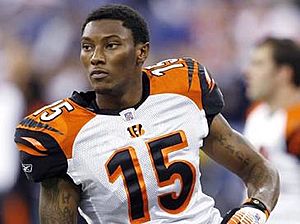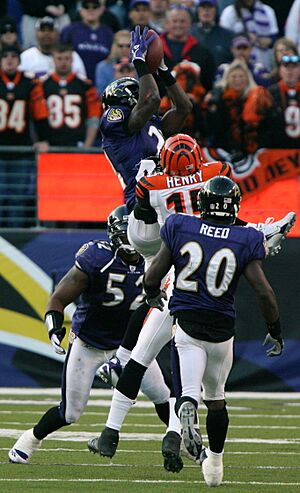Chris Henry (wide receiver) facts for kids

Henry in 2008
|
|||||||||
| No. 15 | |||||||||
|---|---|---|---|---|---|---|---|---|---|
| Position: | Wide receiver | ||||||||
| Personal information | |||||||||
| Born: | May 17, 1983 Belle Chasse, Louisiana |
||||||||
| Died: | December 17, 2009 (aged 26) Charlotte, North Carolina |
||||||||
| Height: | 6 ft 4 in (1.93 m) | ||||||||
| Career information | |||||||||
| High school: | Belle Chasse (Belle Chasse, Louisiana) |
||||||||
| College: | West Virginia | ||||||||
| NFL Draft: | 2005 / Round: 3 / Pick: 83 | ||||||||
| Career history | |||||||||
|
|||||||||
| Career NFL statistics | |||||||||
|
|||||||||
| Player stats at PFR | |||||||||
Chris Henry (May 17, 1983 – December 17, 2009) was an American football player. He was a wide receiver for the Cincinnati Bengals in the National Football League (NFL) for five seasons. He played college football at West Virginia University. The Bengals chose him in the third round of the 2005 NFL Draft.
Chris Henry passed away on December 17, 2009, after an accident. Later, doctors found that he had a brain disease called chronic traumatic encephalopathy (CTE). This disease is caused by repeated hits to the head. Chris Henry was the first active NFL player found to have CTE after his death. This discovery made many people think more about brain safety in football.
Early Life and High School
Chris Henry was born in Belle Chasse, Louisiana. He went to Belle Chasse High School. In his senior year, he was named the best offensive player for small schools in New Orleans. During that year, his team, the Fighting Cardinals, played in the Louisiana AAA State championship game. This big game was held at the Louisiana Superdome. Besides football, Chris was also very good at basketball and track and field.
College Football Career
Henry started at West Virginia University in 2002. He spent his first year as a redshirt. This means he practiced with the team but did not play in games. This allowed him to gain experience without using up a year of his college eligibility.
In 2003, Chris had a great year. He was named the Big East Conference Freshman of the Year. He also made the All-Big East second-team. He caught 41 passes for 1,006 yards and scored 10 touchdowns. He was only the second player in his school's history to get over 1,000 receiving yards in one season. His average of 24.5 yards per catch was the third best in school history for a single season. His best game was against Syracuse, where he gained 209 yards and scored two touchdowns. He also had an 83-yard catch against Rutgers.
In 2004, Henry started seven games. He caught 52 passes for 872 yards and scored 12 touchdowns. After playing in the 2005 Gator Bowl against Florida State, Henry decided to enter the 2005 NFL Draft.
During his sophomore season, Chris was removed from a game against Rutgers University. This was because of penalties for unsportsmanlike conduct. He was also suspended for the last game of the season against the University of Pittsburgh. His coach, Rich Rodriguez, said that Henry's behavior was "an embarrassment."
Chris Henry studied athletic coaching education in college.
College Achievements
Chris Henry was one of the best receivers in Mountaineers' history.
- He was the third player to average more than twenty yards per catch in his career.
- His 1,878 career receiving yards are the eighth most in school history.
- His 93 receptions are the 14th most.
- His 22 touchdown catches are the second most in school history.
- He had six games where he gained over 100 receiving yards. This ties him for third most in school history.
Professional Football Career
Chris Henry was chosen by the Cincinnati Bengals in the third round of the 2005 NFL Draft. This was a big step for him into the professional football world.
Cincinnati Bengals
Henry played his first NFL game on September 18, 2005, against the Minnesota Vikings. In his first year with the Bengals, he caught 31 passes for 422 yards and scored six touchdowns. The Bengals made it to the playoffs for the first time in fifteen years. In their playoff game against the Pittsburgh Steelers, Henry had a 66-yard catch early in the game. However, during that play, both he and Bengals quarterback Carson Palmer got knee injuries.
In his second season, Henry had 36 catches for 605 yards and nine touchdowns. He averaged 16.8 yards per catch. In the second game of the season against the Cleveland Browns, he caught five passes for 113 yards. The next week, he scored two touchdowns against the Pittsburgh Steelers. In the last game of the season, also against the Steelers, Henry gained 124 yards and scored one touchdown.
In 2007, Henry was suspended for eight games. This was for breaking the NFL's rules on personal conduct. He returned to play in week 10 against the Baltimore Ravens. In that game, he had four catches for 99 yards. In the next game against Arizona, Henry caught eight passes for 81 yards and scored a touchdown. He finished the season with 21 catches for 343 yards and two touchdowns.
After an incident in April 2008, the Bengals let Henry go from the team. The team president, Mike Brown, said that Henry had lost his chance to play for the Bengals. He explained that Henry's behavior could no longer be accepted.
Return to Cincinnati
On April 7, 2008, former player and ESPN radio analyst Michael Irvin said he talked with Henry. Henry wanted to "clean up his act." Irvin had also helped Adam "Pacman" Jones do the same. Henry and Jones were teammates at West Virginia. Both had been suspended by NFL commissioner Roger Goodell during the 2007 NFL season.
Bengals receivers like Chad Ochocinco, T. J. Houshmandzadeh, and Andre Caldwell were injured during the 2008 preseason. Because of this, the Bengals re-signed Henry to a two-year contract on August 18. This happened less than a month after Bengals coach Marvin Lewis said the team was not interested in bringing Henry back. Henry served a four-game suspension at the start of the 2008 season. He was allowed to play again on October 4. Henry finished the 2008 season with 19 catches for 220 yards and two touchdowns. In November 2009, he broke his forearm while making a 20-yard catch against the Baltimore Ravens. He was then placed on the injured reserve list, meaning he could not play for the rest of the season.
Passing and Legacy
On December 16, 2009, Chris Henry was injured after falling from a moving truck. His fiancée, Loleini Tonga, was driving the truck during a disagreement. Loleini Tonga has three children with Chris Henry. On December 17, 2009, police in Charlotte announced that Henry had passed away at Carolinas Medical Center. He died from injuries he got during the incident. Two days later, police confirmed that Henry died from a serious head injury. No charges were filed against his fiancée. Police found no evidence that she drove dangerously or too fast. There was no alcohol in Henry's body at the time.
To honor Chris Henry, every NFL game during Week 15 (December 17–21) that year began with a moment of silence.
Bengals coach Marvin Lewis spoke about Henry, saying, "Our football team... watched a guy mature as a young man and work through adversity." He added that Henry became "a beacon of hope."
On December 20, three days after Henry's death, the Bengals played the San Diego Chargers. A moment of silence was held before the game. Bengals wide receiver Chad Ochocinco, who was a close friend of Henry's, cried during the silence. Later in the game, after scoring his first touchdown, Ochocinco knelt down to honor Henry.
In June 2010, researchers found that Chris Henry had a brain disease called chronic traumatic encephalopathy (CTE). This disease is caused by many hard hits to the head during sports. While other former NFL players had been found to have CTE after they died, Henry was the first active NFL player to be diagnosed with it. This discovery raised serious concerns about brain safety in football. It was especially concerning because Henry was young and had never been diagnosed with a concussion in the NFL or college. This led to questions about whether many smaller hits could also cause brain damage over time. Some also believed that the brain damage Henry suffered might have affected his behavior outside of football.
After his passing, Chris Henry's mother decided to donate his organs. His corneas, lungs, kidneys, heart, liver, and pancreas were used in transplants. These donations helped save the lives of four people.
See also
- National Football League player conduct controversy
- List of American football players who died during their careers
 | Precious Adams |
 | Lauren Anderson |
 | Janet Collins |


